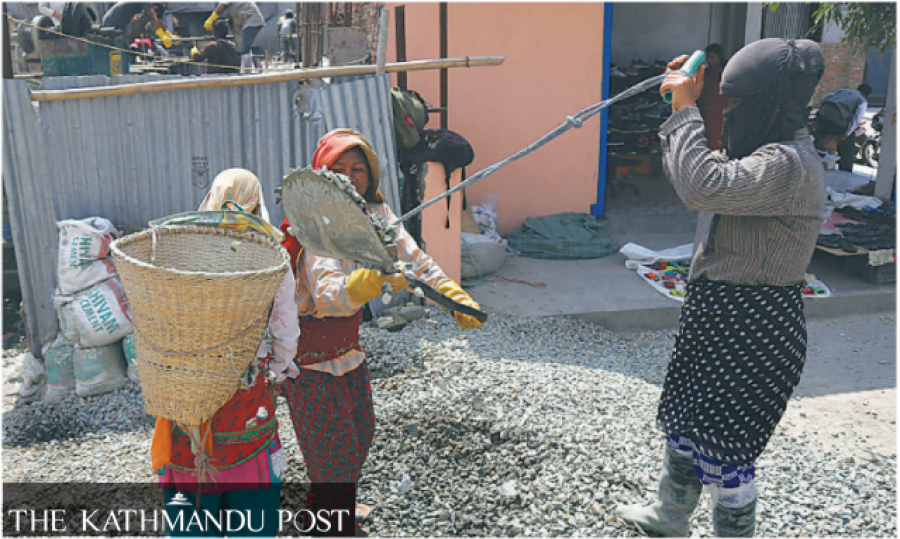National
Construction workers step up demand for social security
As per labour rights groups’ estimates, there are nearly 2.5 million construction workers in the country working in unsafe conditions and without social security.
Chandan Kumar Mandal
Informal sector workers have demanded their enrollment into the Contribution-based Social Security Scheme, which has been only providing coverage to employees from the formal private sector so far.
Informal sector workers, mainly construction workers, have demanded that the government make arrangements for registering them into the social security scheme so that they can also access various benefits promised under the scheme for formal private sector employees.
“Construction workers are the first group of workers who have been demanding social security cover for several years. These are the most vulnerable group of workers,” Naranath Luitel, president of the Central Union of Painters, Plumbers, Electro and Construction Workers-Nepal (CUPECC), told the Post. “Now that the government has implemented the scheme by introducing legislation and included only the formal private sector workers, we want inclusion of the construction workers also in the scheme.”
According to Luitel, nearly 2.5 million workers are employed in the construction industry. They include people employed in private housing, roads and other infrastructure development projects, brick kilns, crusher plants, and forest-based enterprises among others.
“Nearly 85 percent of the country’s total workforce is employed in the informal sector, but this sector has been left out of the social security scheme. The government must work to include the sector in the scheme, which will provide them financial security during difficult times,” said Luitel. “The government needs to make required changes to the existing Act, regulations and working procedures so that informal sector workers also can access the benefits under the scheme.”
Under the social security scheme, an amount equivalent to 31 percent of the worker’s basic salary—11 percent deducted from the worker’s monthly salary and 20 percent contributed by the employer—must be deposited to the social security fund every month.
For their monthly contribution, workers are offered financial security under four categories—medical treatment, health protection, and maternity plan; accidents and disability plan; dependent family plan; and old-age security plan.
Labour rights activists have long been demanding that the social security scheme, which is in its third year of implementation, should also include the informal sector and self-employed workers.
“First of all, the government should announce that the informal sector, which is the largest employer in Nepal, will also be enrolled under the scheme,” said Luitel.
“Then, the government should declare a package for informal sector workers in the annual budget, announcing that the 20 percent amount, which is being paid by employers, will be borne by the government.”
Construction worker groups have also demanded that the government should also collect and maintain data on the total number of workers employed in the construction sector in the country.
“There are discrepancies in the number of construction sector workers in the country. Therefore, systematic registration of such workers should be started at the local level, which is not a difficult thing,” said Luitel. “Besides, the workers should be provided social security cards.”
The Social Security Fund secretariat, which manages the fund and is responsible for the implementation of the scheme, said that the government has already started internal preparations on how the informal sector and self-employed population can be brought under the scheme.
“The Contribution-based Social Security Scheme has envisaged that the entire labour sector, be it informal or formal or government or private, will be brought under the scheme in a phase-wise manner. For now, the scheme has been made mandatory for the formal private-sector workers,” Bibek Panthee, a spokesperson with the Social Security Fund Secretariat, told the Post. “Last two budgets have also talked about bringing the informal sector and self-employed groups under the scheme.”
According to Panthee, a committee has been formed and it is already working out plans and guidelines for including informal sector workers and self-employed groups in the scheme.
“The committee headed by a joint secretary of the Law Ministry has been consulting other stakeholders in this regard. Draft guidelines have been shared among other stakeholders for their feedback,” said Panthee. “From the next fiscal year, informal sector workers, self-employed groups as well as contract-based temporary workers at government offices can register with the scheme.”
In February, the government also made massive changes to the Social Security Scheme Operating Procedures, 2018 to widen the scope of coverage for beneficiaries making it easier to access the benefits available under the scheme.
As of Wednesday, 14,544 employers and 249,277 employees from the formal private sector have registered with the social security scheme which requires monthly contributions from both employers and employees.
According to Luitel, tens of thousands of construction workers will enroll in the scheme if the government makes required arrangements.
“Construction sector workers are among the most vulnerable people, who work in unsafe working environments. Every day, there are workplace accidents happening which leave them with serious injuries and diseases,” said Luitel, the president of the construction workers group. “If they are registered under the scheme, they can get medical treatment and pensions among other benefits. The government should create a situation for attracting them by making necessary policy changes.




 13.12°C Kathmandu
13.12°C Kathmandu














